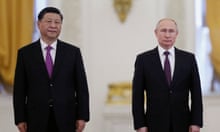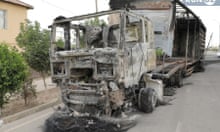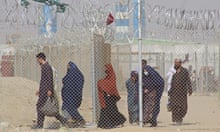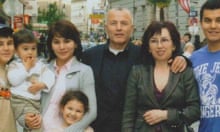Human rights activists in Uzbekistan have reported increasing levels of violence and harassment by police and government agencies as they attempt to document the alleged use of forced labour in the annual cotton harvest.
Local activists said there has been an escalation in attacks on human rights workers and local residents, including beatings and intimidation, arrests and the subjection of female activists to humiliating and intrusive body searches.
Uzbekistan, the fifth-largest cotton producer in the world, has faced sustained criticism and accusations of state-sponsored forced labour over its use of mandatory manual labour in the annual cotton harvest.
Dmitry Tihonov and Elena Urlaeva, prominent campaigners from the Human Rights Alliance of Uzbekistan, claim they faced multiple arrests, physical violence and constant police surveillance while trying to monitor the conditions facing workers in the fields this year.
Tihonov said he was detained and beaten by police last month, after trying to document government buses taking teachers and industrial workers to pick cotton in the fields of the Buka region.
On 29 September, Urlaeva and Malokhat Eshankulova of the Human Rights Alliance of Uzbekistan were arrested and detained alongside two local residents in the Khorezm district. The women claim they were taken to a police station where they were strip-searched before police ordered a gynaecologist to conduct a cavity search with medical instruments, which was done in the presence of male police officers. The activists say their request to be examined in the privacy and safety of a hospital was declined.
“The police were rough with the two local activists we were with,” said Urlaeva, speaking by phone from Uzbekistan. “We had 12 hours of questioning, it was humiliating. They stripped us naked and searched us, they searched our genitals without making hygiene precautions.”
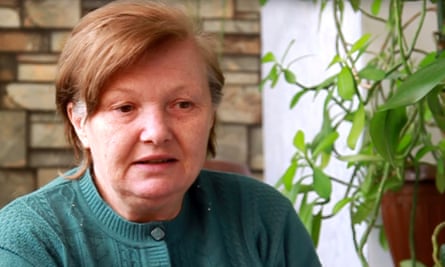
Last year, an estimated 4 million adults were mobilised by the state to pick cotton, with the government establishing quotas on schools, hospitals and local administrations, requiring them to send up to 60% of staff into the fields.
The 2014 harvest generated 3.3m tonstons of cotton, mainly for export. Revenues from cotton have contributed substantially to developing the country’s industrial sector and keeping food and energy prices stable.
In recent years, there has been a push by the Uzbek government to allay international fears over the mass mobilisation of its citizens throughout the harvest. The drive follows a high-profile ban on Uzbek cotton by retailers and fashion brands.
Last year, the UN’s International Labour Organisation praised Uzbekistan for its efforts to end child labour and the US State Department upgraded the country from the lowest tier of its annual Trafficking in Persons report, stating that the country had made significant progress in tackling its forced labour issues.
Yet international human rights and anti-slavery groups are warning that this year’s violence against activists marks an escalation in efforts by the Uzbek government to prevent reports of forced labour from making their way into the international spotlight.
“We are very concerned about the rising levels of violence against local activists attempting to document the mobilisation of the population into the fields,” said Matthew Fischer-Daly, coordinator of the Cotton Campaign, an international coalition set up to monitor the use of forced labour in the Uzbek cotton harvest.
“We have not seen this kind of physical threat and intimidation before and it is a very concerning development in the government’s attempts to silence local people trying to monitor human rights violations in the annual harvest and promoting the enforcement of local and international laws prohibiting forced labour. The very public humiliation and intimidation that both Ms Urlaeva and Ms Eshankulova had to face is of particular concern.”
Klara Skrivankova, Europe programme and advocacy coordinator at Anti-Slavery International, said international efforts to hold Uzbekistan to account on human rights in its cotton harvest must continue. “There seems to be a correlation between the efforts by the government to show the situation is improving and the attempts to silence anyone who dares to portray a picture different to the official line,” she said.
“The international community has failed to respond to this situation, choosing to focus on highlighting the progress instead. Since 2012, when the government stopped forcing children to pick cotton on a systematic scale, Uzbekistan enjoyed a spell of goodwill from international organisations.
“If, at the same time, there are attempts to silence those who expose the continued mass-scale forced labour perpetrated by the Uzbek government … then we cannot speak about real progress or meaningful change. [The] international community needs to put real pressure on the Uzbek government again … and demand a stop to brutal harassment of the activists.”



